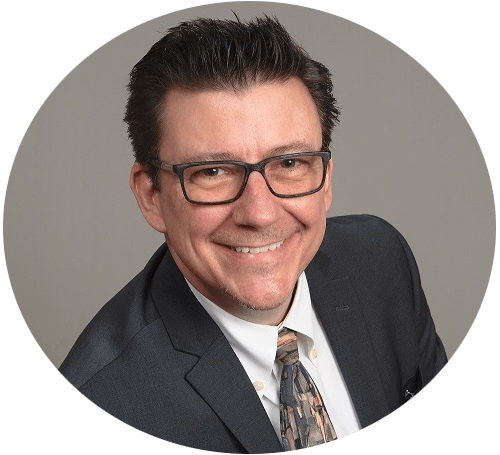

Sam McCollough:
Author and
Keynote Speaker
Book Sam to speak at your next event on how we all can be a part of the fight against misinformation, disinformation, fake news, and deep fakes.
Check out my site www.dontgetbunked.com for access to The Bunkproof Toolkit™ and my training course Bunkproof in 30 minutes™ to learn how scams, fake news, misinformation, and deepfakes really work — and how to stop them — in just 30 minutes.
DEBUNK: Arm Yourself With the Tenets of Critical Thinking
Plus: How to Combat Disinformation and Fake News
Learn About:
Debunking & Spotting Fake News and Deep Fakes
Principles of Logic & Logical Fallacies
Good Science, Outdated Science, and Pseudoscience
Conspiracy Theories
... and more!
Summarized as Tenets within the Text and at the End of the Book
About the Author
Sam started his journey of understanding the world as it is in the late 1970s when he first read Carl Sagan’s The Dragons of Eden: Speculations on theEvolution of Human Intelligence.
He earned his Bachelors of English with a minor in History cum laude from the University of Maryland University College (now University of Maryland Global Campus) in 1992.
He has spent the past 40+ years educating himself with countless science books written for the layman on subjects as diverse as cosmology, physics, biology, anthropology, psychology, philosophy, logic, and critical thinking.
Sam saw a need for DEBUNK: Arm Yourself With the Tenets of Critical Thinking because humans have never been that great at differentiating truth from lies if they have not been taught how to, and because modern technologies are making it even harder.
He has been teaching adults and designing and writing instructional materials for 25+ years.
Book Reviews & Testimonials
Here are excerpts from an editorial review of DEBUNK from BookLife:
Synopsis: The book is a reference for how to be a good critical thinker, exploring several different aspects of critical thinking. Some of these include logical fallacies, cause and effect reasoning, axioms of science and the scientific method, conspiracy theories, and debunking. The debunking chapter provides tactics and resources for spotting misinformation and disinformation, fake news, and deep fakes. This is a timely book, much needed in this era of disinformation.
In this compact guide to training the brain for the new era of digital media, McCollough introduces his "Tenets of Critical Thinking" and provides clear, practical guidance on how to avoid the “pitfalls” that even intelligent people can fall for, especially online: confirmation bias, logical fallacies, misinformation, pseudo science, deep fakes, and more. A champion of the scientific method and principled debunking of misinformation, McCollough lays bare the urgency of the problem– "The Internet helps lies to spread much faster, and AI makes it much harder to detect the lies.” Through detailed research and real-world examples, this resource provides clear definitions of the ways that nonsense gets passed off as truth plus actionable steps to stop simply accepting what we're told—and to demonstrate, though time-tested steps, truth from falsehoods.
Writing in a personable tone, McCollough implores readers to apply logic and critical thinking skills to everything they are told, from the government, news outlets, in school curriculums, and especially any time we might feel pressed to surrender money or our personal information. "Be skeptical,"he writes, noting that “there is money to be made by feeding into people’s paranoia.” Through brisk, organized chapters, McCollough explores the history of scientific reasoning (science, he argues, is “the greatest good that humans have ever come up with”) and lays out how to incorporate its rigor and logic into everyday thinking. McCollough convincingly demonstrates the importance of parents learning this for themselves and also teaching it to their children.
... Debunk offers a quick, inviting introduction to the "real-world consequences" of misinformation and outdated science, providing multiple avenues—“Observe, Predict, Test”— to keep from being taken in.
... readers new to the question of what we can do to shore our minds’ defenses up in this ever-evolving information age will find much here that is instructive and illuminating.
Takeaway: Clarifying introduction to critical thinking in the extremely online era. Be the first to share a testimonial!
Get in Touch
Contact me about bulk orders or to discuss booking a talk for your next event.
Book Excerpts
The invention and widespread use of computers, and especially the proliferation of
the Internet, brought us into a time when ordinary people have immediate access
to more information than professors, librarians, and heads of state had access
to only a short time ago. This is quite a paradigm shift in only a few
generations. It is empowering, but it is also dangerous–the Information Age is
also the Misinformation and Disinformation Age, and it is easier to find bad
information on the Internet, especially with the addition of AI, than good.Being able to question and analyze information is the most important skill that
anyone can have now, and we should teach ourselves and our children the tools
for this.... we will first discuss critical thinking in general, and then we will look at some areas of critical thinking that
deserve special attention:· Principles of logic and logical fallacies
· Types of causes and effects
· Axioms of science
· The Scientific Method
· Differentiating between good current science, outdated science, and pseudoscience
· Conspiracy theories
· Epistemology
· Agnotology (the nature of misinformation)
· Debunking misinformation, disinformation, and deep fakes
... criticalthinking is not only useful for identifying misinformation and disinformation,
it helps us to think more soundly in all aspects of life. It can help you
communicate more effectively, make better decisions, and be better at your job
or other hustle.
Contact
Phone: 561-450-5535
Email: sam@
Copyright © Sam McCollough

